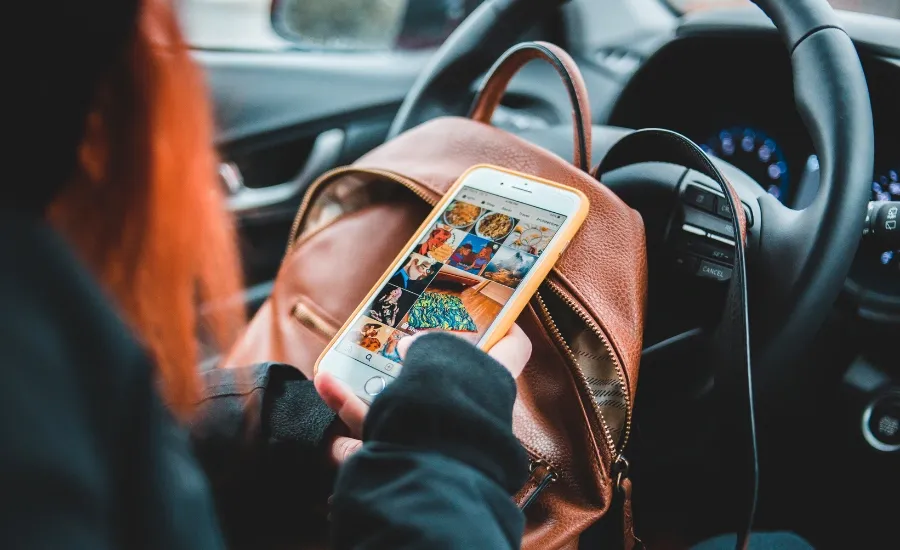You hit "post" on your Instagram story, then immediately feel a knot in your stomach. Did you just share too much? Should you delete it? You refresh to see if anyone's viewed it yet, already second-guessing yourself.
If this sounds familiar, check this out: a study published in the journal Computers in Human Behavior found that nearly 48% of social media users have experienced regret after posting content online. And for women, the pressure to be authentic, vulnerable, and relatable—while also maintaining professional boundaries—makes navigating oversharing on social media feel like walking a tightrope.
The truth is, there's a fine line between genuine connection and TMI. So, let’s break down the 7 telltale signs you might be oversharing, the psychology behind why we do it, and let’s see some practical strategies to establish healthier digital boundaries without losing the authentic connections that make social media valuable in the first place.
What Is Oversharing on Social Media?
Oversharing isn't about posting frequently or being open about your life. It's about crossing the line from authentic sharing into territory that makes you vulnerable in ways you might later regret—or that impacts others without their consent.
Authentic sharing looks like: posting about a career win you're proud of, sharing a vulnerability that might help others feel less alone, or documenting meaningful moments in your life. These posts feel intentional. They add value to your community or help you process something meaningful.
Oversharing looks like: posting details of an ongoing conflict while emotions are running high, sharing information that could damage your professional reputation, or revealing intimate details about others without their permission. These posts often come from a place of seeking immediate validation or processing emotions publicly rather than with trusted friends or a therapist.
Here's what matters most: context. What feels like authentic vulnerability on a personal account with close friends might be oversharing on a public platform visible to colleagues and acquaintances. The same content can land differently depending on who's seeing it and what you're trying to accomplish by sharing it.
This isn't about perfectionism or pretending your life is Instagram-filter flawless. It's about being intentional with what you share and protecting your peace—and the privacy of people in your life—in the process.
Why Do We Overshare on Social Media?
Spoiler: it's not because you lack self-control or boundaries. Social media platforms are literally designed to encourage this behavior.
The Psychology Behind Digital Oversharing

Every time you post something vulnerable or personal and receive likes, comments, or supportive messages, your brain releases dopamine—the same neurotransmitter associated with rewards and pleasure. According to research from UCLA's Brain Mapping Center, receiving social media engagement activates the same reward pathways in your brain as eating chocolate or winning money.
This creates a feedback loop: you share something personal, you get validation, your brain wants more validation, so you share more. It's not weakness—it's biology meeting technology designed to exploit human psychology.
There are other factors at play, too. Social media creates an illusion of intimacy. When you're sharing with hundreds or thousands of followers, it can feel like you're talking to close friends, even though most of your audience consists of acquaintances, colleagues, or near-strangers. This false sense of closeness can lower your guard and make oversharing feel natural.
We're also processing our lives publicly in ways previous generations never did. Instead of calling a friend to vent about a bad day or writing in a journal to work through feelings, we post. Social media has become our real-time diary, our therapist's couch, and our support group—often all at once.
There's no shame in seeking connection this way. Humans are wired for community and validation. The problem is that social media offers a simulacrum of these things—one that comes with consequences that genuine, private relationships don't carry.
Is oversharing on social media a mental health issue?
Oversharing itself isn't a mental health diagnosis, but it can be a symptom of underlying issues like anxiety, low self-esteem, or difficulty with emotional regulation. According to clinical psychologists, people who struggle with boundaries in real life often struggle with digital boundaries too. If you find yourself compulsively oversharing despite negative consequences, or if social media use is impacting your mental health, relationships, or professional life, it might be worth exploring these patterns with a therapist.
7 Signs You're Oversharing on Social Media
Ready to assess your own social media habits? Here are seven signs that you might be posting too much—or sharing things you'll later wish you'd kept private.
1. You've Experienced Post-Regret More Than Once
Post-regret is that sinking feeling you get hours or days after sharing something online. Maybe you're refreshing your feed obsessively, watching to see who's viewed your story. Maybe you're lying awake at 2 am wishing you could take back what you posted. Maybe you've actually gone back and deleted posts because you felt exposed or embarrassed.
If you regularly find yourself in damage-control mode after posting—explaining what you "really meant" in the comments, deleting content, or feeling anxious about specific people's reactions—that's your gut telling you that you crossed a boundary you weren't comfortable crossing.
One study from the Pew Research Center found that 54% of social media users have taken breaks from at least one platform specifically because of something they regretted posting. That number climbs even higher for women ages 25-35.
The fix: Before posting anything vulnerable or personal, wait 30 minutes. Step away from your phone, do something else (start a hobby, maybe?), and then revisit what you wrote. If it still feels aligned with your boundaries and you're comfortable with your boss, your mother-in-law, and an ex-colleague all seeing it, then post. If not, save it to your drafts or delete it entirely.
2. Your Feed Reads Like a Real-Time Diary
There's sharing your life, and then there's live-documenting every thought, feeling, and mood swing throughout your day. If you're posting multiple times daily about personal situations—relationship ups and downs, work frustrations, family drama, health concerns—your social media has likely become a digital diary rather than a curated glimpse into your life.
Ask yourself: Are your closest friends learning about major events in your life through Instagram rather than through actual conversation? Are you processing emotions via caption instead of calling a friend? Do you feel compelled to document every experience immediately as it's happening?
Here's the thing: your life is yours to share as you see fit. But when social media becomes your primary emotional outlet, it often means you're seeking validation from an audience rather than processing your feelings in healthy, private ways.
A 2024 survey by the American Psychological Association found that people who used social media as their primary method of emotional processing reported higher levels of anxiety and lower satisfaction with their close relationships. Processing emotions privately—through journaling, therapy, or conversations with trusted friends—actually leads to better emotional regulation and stronger real-world connections.
Reality check: If your close friends are learning about your life through Instagram or TikTok rather than conversation, it might be time to reassess. The most meaningful connections happen off-screen.
3. You're Sharing Details That Could Impact Your Professional Life
We've all seen those cautionary tales: someone loses a job opportunity because of old social media posts, or a professional reputation gets damaged by complaint-filled stories about work. Yet in the moment, when you're frustrated with a colleague or venting about a terrible meeting, hitting "post" feels cathartic.
Oversharing at work doesn't just mean posting photos from the office. It includes complaining about your job (even vaguely), sharing details that contradict your professional image, posting content you'd be embarrassed for your boss or clients to see, or forgetting that even "private" accounts aren't truly private.
According to a 2024 CareerBuilder survey, 70% of employers use social media to screen candidates during the hiring process, and 54% have decided not to hire someone based on their social media content. Even if your accounts are private, screenshots are forever, and professional networks are smaller than you think.
This doesn't mean you need to present a fake, corporate-approved version of yourself online. It means being strategic about what aspects of your personality and life you share publicly. Your authentic self can include boundaries.
The question to ask: Would I be comfortable with this post being screenshotted and shared in a work Slack channel? If the answer is no, don't post it.
4. You Overshare When You're Emotional
Late-night posting. Angry-typing a caption. Posting through tears during a fight. Sharing something vulnerable moments after a breakup. If you've done any of these, you've experienced emotional oversharing—and you probably also experienced the regret that comes afterward.
When we're in an activated emotional state—angry, hurt, sad, anxious—our prefrontal cortex (the part of our brain responsible for judgment and decision-making) goes somewhat offline. In these moments, posting feels like the right move. It feels like you're taking action, standing up for yourself, or getting support. But you're making a permanent decision in a temporary emotional state.
Research published in the Journal of Social and Personal Relationships found that people who post during emotional distress are significantly more likely to share information they later regret, and these posts can actually damage both professional and personal relationships.
The most dangerous posts? Those about other people in your life. Venting about a friend, partner, or family member might feel justified in the heat of the moment, but those words don't disappear when you've calmed down. And even if you don't name names, the people involved—and others in your circle—often know exactly who you're talking about.
The 24-hour rule: If what you want to post is emotionally charged—especially if it involves conflict or venting—wait a full day before sharing. Write it in your notes app if you need to get it out, but don't hit publish until you've had time to cool down and reflect on whether this is something you truly want to be public.
5. People in Your Life Have Asked You to Share Less About Them
This one is straightforward but important: if a partner has asked you to stop posting about your relationship, if friends have requested you not tag them in certain content, or if family members feel uncomfortable with what you share about them, that's oversharing.

It doesn't matter if you think what you're sharing is harmless or flattering. It doesn't matter if "it's your story to tell." Other people's privacy deserves protection, even if you're comfortable being an open book.
The rise of "sharenting" (parents oversharing about their children) has brought this issue into focus, but it applies to all relationships. Your partner's vulnerabilities, your friend's personal struggles, your sibling's life choices—these aren't yours to broadcast without explicit permission.
And here's what's tricky: getting permission once doesn't mean you have permission forever. Someone might be okay with you posting about them in one context but uncomfortable in another. The burden is on you, as the person sharing, to check in regularly and respect the boundaries of people in your life.
Important note: "But it's my story too!" Yes, but if your story involves someone else's private information, feelings, or experiences, their right to privacy trumps your desire to share. Full stop.
6. You're Sharing Intimate Details of Others Without Permission
This goes deeper than tagging someone in an unflattering photo. It's sharing details about a friend's breakup, posting about someone's health struggles, discussing family conflict or drama, announcing news that isn't yours to announce (like pregnancies or job changes), or tagging people in content they might find embarrassing or invasive.
Even if you're being supportive—even if you think you're celebrating someone or raising awareness for something important—consent is non-negotiable. Just because information was shared with you privately doesn't mean you have permission to make it public.
This also applies in professional contexts. Sharing that you're working with a certain client, posting about a colleague's personal life, or discussing workplace dynamics all have consequences. You might think you're being vague enough, but your network probably knows exactly what—and who—you're talking about.
The consent rule: If it's not exclusively your news to share, don't share it without explicit permission. And even then, let the person review what you plan to post before it goes live.
7. Social Media Has Become Your Primary Form of Communication
The most subtle sign of oversharing isn't about individual posts—it's about how you're using social media overall. If major life updates happen via post before you've told your closest friends in private conversations, if you're more comfortable sharing online than in person, or if you measure life experiences by their "post-ability," social media has crossed from tool to crutch.
This shift is gradual. It starts innocently: posting about a promotion because it's exciting and you want to celebrate. But over time, social media can become the first place you turn when anything happens—good or bad. Real friendships start to feel secondary to your online presence. You might even catch yourself thinking about how an experience will look as a post before you've actually experienced it.
According to research from the University of Pennsylvania, people who reduced their social media use to 30 minutes per day reported significant reductions in loneliness and depression compared to a control group that used social media as usual. The study suggests that the more we substitute online sharing for real-world connection, the more isolated we actually feel.
The reflection question: Are you living your life or curating it? If every moment is filtered through the lens of "is this shareable?", you're not fully present—you're performing.
How to Stop Oversharing: Setting Healthier Social Media Boundaries
Recognizing that you're oversharing is the first step. Actually changing the behavior requires intentional boundaries. Here's how to start.
1. Create Your Personal Sharing Guidelines
Sit down and write out your social media boundaries. What topics are completely off-limits? (Examples might include: work complaints, relationship conflicts, details about others without permission, emotional posts made in the moment.) What requires a waiting period before posting? What accounts are for what purposes?
Your sharing guidelines might look something like:
- I don't post about work frustrations or colleagues, ever
- I wait 24 hours before posting anything written while upset
- I ask permission before posting photos with friends or details about them
- I keep relationship problems private until they're resolved
- I don't share health or medical information publicly
Write these down. Put them in your phone notes. Refer back to them when you're tempted to overshare.
2. Practice the "Would I Say This in Person?" Test
Before hitting post, ask yourself: Would I announce this to a room full of acquaintances at a party? Would I be comfortable with this being read aloud at work? If you wouldn't say it in these contexts, reconsider posting it online.
This test helps distinguish between genuine vulnerability (which you might share with close friends) and oversharing (broadcasting to an audience of hundreds or thousands). Social media collapses context—your boss, your high school friends, and your yoga instructor all see the same content. If you wouldn't want all those audiences hearing something, don't post it.
3. Find Offline Outlets for Processing
Not everything needs an audience. Some thoughts, feelings, and experiences are better processed privately—through therapy, journaling, or conversations with trusted friends.
If you notice you're reaching for your phone to post every time you're upset, anxious, or dealing with something difficult, that's a sign you need better offline coping mechanisms. Consider starting a private journal (the paper kind or a password-protected digital one), finding a therapist if you don't already have one, or cultivating closer friendships where you can process feelings without broadcasting them.
The goal isn't to bottle everything up. It's to find appropriate outlets that don't come with the risk of damaging your reputation, violating others' privacy, or sharing things you'll later regret.
4. Audit Your Motivations Before Posting
Before you post anything personal or vulnerable, pause and ask yourself: Why am I sharing this? What do I need right now?

Are you seeking validation? Trying to prove something? Hoping specific people see it? Avoiding a difficult private conversation? Processing emotions you don't know how to handle? Or are you genuinely sharing something that feels aligned with your values and boundaries?
There's no judgment here—sometimes we all seek validation or want to feel seen. But when that's the primary motivation, social media rarely delivers what we actually need. A therapist, a close friend, or even a good long cry might serve you better than posting ever could.
5. Use Private Accounts Mindfully
Having a private account isn't a free pass to overshare without consequences. Yes, it offers more control over who sees your content, but remember: nothing online is truly private. Screenshots exist. Friends of friends might see your content. People you approve today might not be in your life tomorrow.
Even with a private account, maintain boundaries. Limit your followers to people you actually trust. Regularly audit who has access to your content. And still apply the same discretion you would on a public account when it comes to posting about work, conflicts, or other people.
Oversharing on social media isn't about being "too much" or needing to hide who you are. It's about recognizing that not everything that happens in your life needs to be documented, not every feeling needs an audience, and not every experience needs to be filtered through the question of "how will this look online?"
Setting boundaries around what you share isn't restrictive—it's protective. It protects your professional reputation, your relationships, your peace of mind, and the privacy of people you care about. It allows you to be present in your actual life instead of constantly narrating and curating it for an audience.
What's considered "oversharing" for one person might be authentic connection for another, and that's okay. Your boundaries are yours to set. But if you recognized yourself in any of these seven signs, consider this your permission slip to pull back, reassess, and find a healthier relationship with social media.
Your goal shouldn’t be to curate a perfect, filtered life or pretend you don't have struggles and vulnerabilities. It's to share consciously, protect what's sacred, and remember that your most meaningful moments don't need an audience. They just need to be lived.
 THE WORKING GAL
THE WORKING GAL





